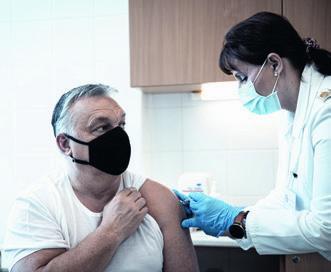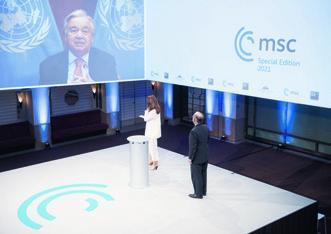Points From Munich
2021-04-01ByMabelLuMiao
By Mabel Lu Miao
Three areas have emerged as priorities for international cooperation from the special edition of the Munich Security Conference held virtually on February 19, where the participants discussed how to rebuild and renew the transatlantic alliance in the face of global threats such as the COVID-19 pandemic and climate change.
COVID-19 response
With over 2.54 million deaths and more than 114 million infections globally by March 3, according to Johns Hopkins University, promoting global cooperation to control the pandemic is of utmost urgency.
So far, vaccination seems to be the most powerful weapon against the disease. But some low- and middle-income countries and populations still do not have access to vaccines. The global production capacity, which is below the global demand, and the stringent storage and transportation requirements for the vaccines produced in the West have added to the challenges to carry out largescale vaccination.
UN Secretary General António Guterres outlined four imperatives at the virtual conference, including coming up with a global vaccination plan. “Vaccines must be available and affordable for everyone everywhere. Vaccine equity is crucial for saving lives and saving economies. We need at least doubling of global manufacturing capacity through sharing of licenses and technology transfers,” he said, expressing the belief that the Group of 20 was well placed to establish an emergency taskforce to prepare such a global vaccination plan.
Guterres called for the participation of all countries, companies, international organizations and financial institutions that have the required power, scientific expertise and production and financial capacities.

China is already cooperating with other countries to make its domestically developed vaccines available to them. It has provided vaccine assistance to 53 countries, while Chinese enterprises have exported or are exporting vaccines to 27 countries.
In addition, the Chinese Government has announced it will provide 10 million doses to COVAX, the global alliance for equitable distribution of vaccines, mainly for other developing countries.
As the worlds three largest economies, the U.S., China and the EU should convene a vaccine summit and establish a trilateral dialogue and coordination mechanism to advance cooperation in vaccine research, production and distribution under the coordination of the World Health Organization. All efforts should be made to prevent vaccine nationalism.
Climate change
Climate change followed by global warming and other fallouts is another major challenge threatening humanity.
Climate change, unless managed, will
not only kill five times as many people per year by the end of the century as the pandemic is doing today but also cause massive instability, Microsoft co-founder Bill Gates said at the meeting.
The Paris Agreement on climate change aims to limit global warming to well below 2 degrees Celsius, preferably to 1.5 degrees Celsius, compared to pre-industrial levels. In accordance with this goal, many countries have formulated detailed carbon emission reduction targets and measures.
China, a global leader in renewable energy production, has pledged to peak emissions before 2030 and to achieve carbon neutrality before 2060. On February 1, China launched the worlds largest carbon trading market to help meet its carbon neutrality goal.
In order to accelerate emission reduction and meet the needs of developing countries, a global climate summit including the Group of Seven (G7) countries and China, Russia and India should be convened.
This “G10,” including the biggest carbon emitters in the world, will facilitate international multilateral climate cooperation. The expansion will also increase the representation of the G7 from 10 percent of the worlds population to 47 percent.
Besides, it would bring together representatives of both developed and developing countries, building a bridge of communication and cooperation between countries at different development levels.
Protecting the environment and promoting sustainable development is a shared global responsibility. Dealing with climate change will also open new development opportunities, such as creating new jobs, alleviating demographic pressures, advancing cross-border new energy cooperation, and promoting friendly exchanges between countries.

China-U.S. dialogue
U.S. President Joe Biden signaled that the U.S. is returning to multilateralism. But whether the EU will accept the hand Biden is extending depends on how Germany and France define their future cooperation and coordination. German Chancellor Angela Merkel made it clear in her speech at the meeting that Germany will follow its own stand on international issues.
However, the U.S. return to multilateralism can help to ease tensions with China.
Under Bidens administration, there are at least four areas where China and the U.S. can start dialogue: climate change, COVID-19 control, World Trade Organization reform, and entry into the Comprehensive and Progressive Agreement for Trans- Pacific Partnership (CPTPP), the trade agreement among 11 countries.
The U.S. had pulled out of the original agreement from which the CPTPP evolved, the Trans-Pacific Partnership, under Donald Trump. Both China and the U.S. should explore the possibilities of joining the CPTPP.
The two countries should also restart negotiations on their bilateral investment treaty(BIT), which were launched in 2008 but were later suspended.
According to the American Chamber of Commerce in China, a China-U.S. BIT would help to reduce the United States trade deficit. It would also catalyze global postCOVID-19 economic recovery, like the SinoEU Comprehensive Agreement on Investment and the Regional Comprehensive Economic Partnership, the free trade agreement between 15 Asia-Pacific economies. BR
